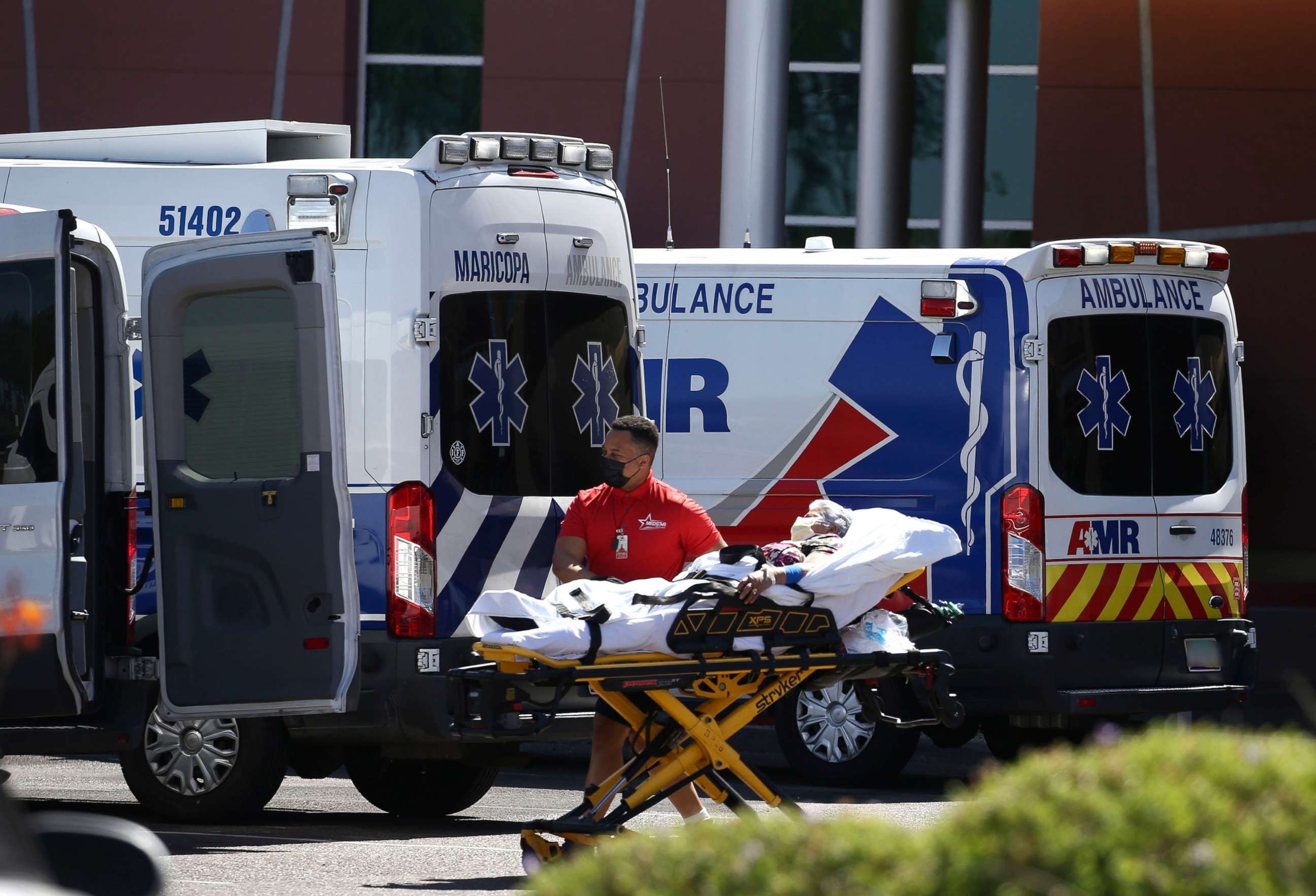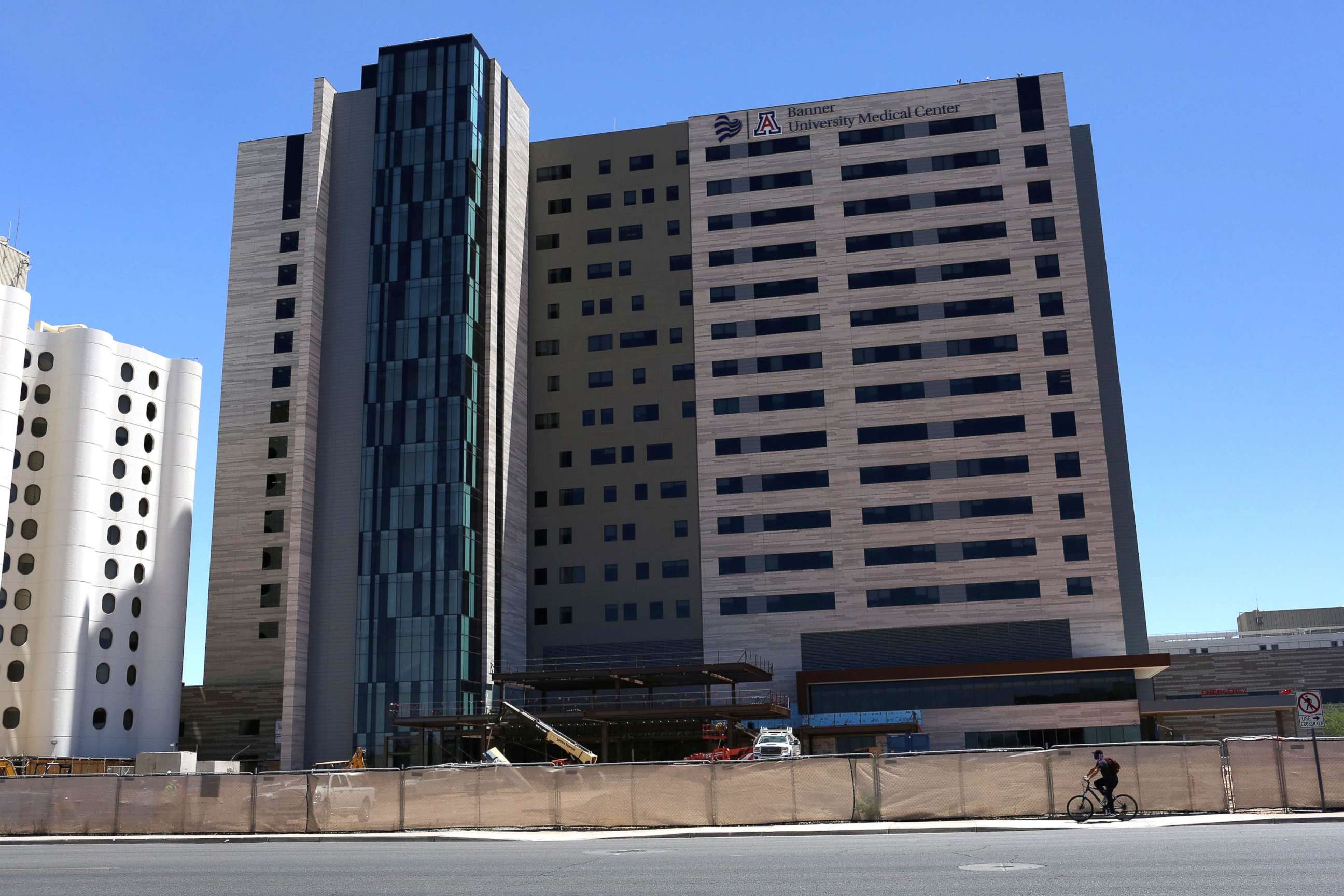Arizona doctors worry as ICUs fill: 'We’re leaving the hospital sometimes in tears'
The state "is on the brink of losing control of the epidemic," one doctor said.
Hospitals in Arizona are seeing an intense wave of new coronavirus cases, doctors at the Banner University Medical Center in Phoenix told ABC News on Monday, and it is filling up their intensive care units and pushing their nurses to the brink.
Dr. Jennifer O'Hea, a Banner ICU doctor overseeing 100 patients, said the situation "exploded" towards the end of May and has snowballed into a dire situation.
"Never, never, ever have I seen this many patients in our ICU," O'Hea, who has worked at the hospital for 22 years, said. "We were using ICUs that we've never used before. Rooms that were vacant we're now using as ICUs."
Dr. Marjorie Bessel, the chief clinical officer for the Banner Health System, told ABC News she has "been concerned for weeks."
"We're not New York at this time. What we're concerned is we don't want to become New York," Bessel said. "The curves suggest we could be headed there."
Banner Health System is the largest healthcare delivery system in Arizona -- a state that has seen a significant and worrisome outbreak of the virus in recent weeks as over 30 states across the country report increases in cases after reopening.
Arizona set new records for new cases and hospitalizations just this weekend, according to an ABC News analysis, with over 3,800 new cases and 2,691 hospitalizations reported.
Banner Health, which has 17 hospitals across the state, is treating nearly 50% of those hospitalized in Arizona.
"Patients are dying, patients are suffering, they're on ventilators for weeks. Families cannot be here," O'Hea said. "There are patients begging me not to put them on a breathing machine because they know that they might die, they might never talk to their families again."

Still, the hospital is participating in a state-run surge plan that sees patients transferred in helicopters and ambulances from one hospital to another when capacity is full. As of today, just two of Banner's 17 Arizona hospitals can accept patients from the surge line because of capacity issues relating to bed availability and staffing -- an indicator of just how strained the system truly is.
One patient at a Banner hospital in Phoenix, Jessica O'Neil, told ABC News she had taken precautions like wearing a mask to avoid contracting COVID-19. The 30-year-old single mom who has multiple preexisting conditions, believes it was a single trip to the gym that led to her infection.
"It was actually my first time going to the gym, and then after the gym, I just did not feel well at all," she told ABC News. "I was telling my daughter, if I don't feel well, that in the morning I was going to go straight to the [emergency room] and, in the morning, the body chills were just so persistent and then the coughing started."
Hospitalized for seven days now, O'Neil says people should take the virus more seriously. "Like, I don't know how to stress that enough," she said.
Jimmy Flores, of Scottsdale, Arizona, admitted he didn't take it seriously enough and told ABC News a story about a recent outing that landed him in the emergency room.
"It was a very busy bar," he said. "I mean, there was a lot of actions that could have been better, like sharing drinks... So there I was, just a really high risk of getting COVID there from other people in that environment."
After spending more than a week in the hospital, he's now home recovering and urging others to be vigilant.
"My penance was first going public," he said. "I didn't want to go public... I went public because when I was sitting there in my bed thinking that I was possibly going to die, I was looking at my friends on Facebook still partying."
As of Monday, there have been over 75,000 cases of the coronavirus in the state, and 1,588 people have died, according to the state health department website. Nearly 7,500 cases were reported in just the last two days alone.
With cases and hospitalizations rising quickly, Dr. Bradley Dreifuss, an emergency medicine physician in Tucson, told ABC News he fears Arizona "is on the brink of losing control of the epidemic."
But it's not just the patients who are suffering. The emotional toll on nurses and staff is extraordinary, and staffing remains a main concern as capacity grows. Dr. O'Hea said the hospital starts "everyday" short on nurses.
"We have people calling out from work because they're emotionally overwhelmed, considering other careers," Dreifuss said, describing the stress as "exhausting."
"We're leaving the hospital sometimes in tears."
The dire situation has left doctors pleading with the public to begin masking, and wondering why it hasn't been mandated. The CDC recommends that people wear masks to reduce the spread of COVID-19, especially if social distancing is not possible.
"I absolutely think that our leadership here in Arizona has cost lives. If people were masking weeks ago, we could have prevented this," O'Hea said.

Dreiffus added it makes doctors "angry" and "frustrated" to see people without masks. "I have colleagues who say if they see one more person unmasked, they're going to quit. Of course, it's a bit of hyperbole, but really, it's frustrating."
But with cases continuing to rise with no end in sight, Dreiffus worries about the long term. When flu season arrives in the fall, and even more more people require medical care, how are they going to keep up with both diseases?
"My concern is that we're not going to have a break before the big flu/COVID-19 wave that's going to come this winter. And who's going to be staffing that? If residual workers get sick, we're not going to have the workforce," Dreiffus said, noting the combination will be "devastating."
"It stands to crumple our health system across the board," Dreiffus added.
What to know about the coronavirus:
- How it started and how to protect yourself: Coronavirus explained
- What to do if you have symptoms: Coronavirus symptoms
- Tracking the spread in the U.S. and worldwide: Coronavirus map
Tune into ABC at 1 p.m. ET and ABC News Live at 4 p.m. ET every weekday for special coverage of the novel coronavirus with the full ABC News team, including the latest news, context and analysis.





